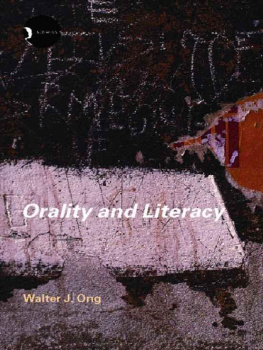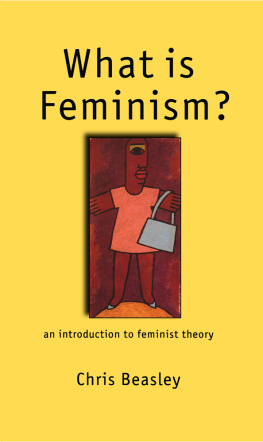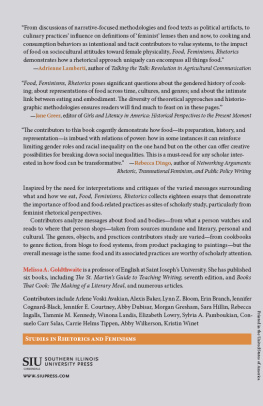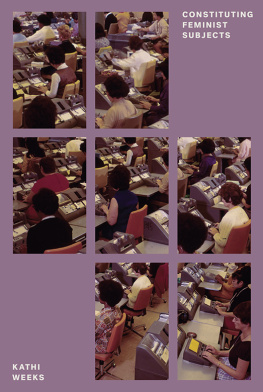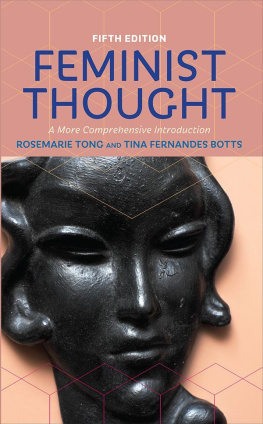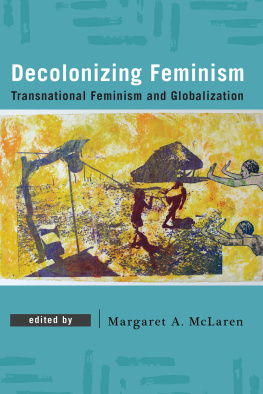The Rhetorics of Feminism
Is it possible that changes in rhetorical practice could alter not just how thought is expressed, but also how it is made? Through a close stylistic and rhetorical analysis of contemporary feminist writing -from the cultural theory of Judith Butler to the popular journalism of Naomi Wolf and Germaine Greer Lynne Pearce demonstrates how feminist thought is created as well as communicated through the frameworks in which it is presented. By linking rhetorical innovation with feminist epistemology in such a direct way, this is a book that will be of immense methodological as well as theoretical interest to readers, providing valuable insight into the often mysterious processes of conception and composition. This book will be of interest to students and academics alike working in the fields of women's studies, literary and cultural theory, journalism, linguistics and communication studies.
Lynne Pearceis Professor of Literary Theory and Women's Writing at Lancaster University.
Transformations: thinking through feminism
Edited by Maureen McNeil. Institute for Women's Studies.
Lancaster University
Lynne Pearce, Department of English, Lancaster University
Beverley Skeggs, Department of Sociology. Manchester University
Other books in the scries include:
Transformations
Thinking through feminism
Edited by Sara Ahmed, Jane Kilby, Ceila Lury, Maureen McNeil and
Beverley Skeggs
Thinking Through the Skin
Edited by Sara Ahmed and Jackie Stacey
Strange Encounters
Embodied others in post-coloniality
Sara Ahmed
Jacques Lacan and Feminist Epistemolngy
Kirsten Campbell
Feminism and Autobiography
Texts, theories, methods
Edited by Tess Cosslett, Celia Lury and Penny Summerfield
Advertising and Consumer Citizenship
Gender, images and rights
Anne M. Cronin
Mothering the Self
Mothers, daughters, subjects
Stephanie Lazier
When Women Kill
Questions of agency and subjectivity
Belinda Morrissey
Class, Self, Culture
Beverley Skeggs
Haunted Nations
The colonial dimensions of multiculturalisms
Sneja Gunew
The Rhetorics of Feminism
Readings in contemporary cultural theory and the popular press
Lynne Pearce
The Rhetorics of
Feminism
Readings in contemporary cultural
theory and the popular press
Lynne Pearce
First published 2004
by Routledge
2 Park Square, Milton Park, Abingdon, Oxon, 0X14 4RN
Simultaneously published in the USA and Canada
by Routledge
270 Madison Ave, New York NY 10016
Routledge is an imprint of the Taylor & Francis Group
Transferred to Digital Printing 2006
2004 Lynne Pearce
Typeset in Times by
Florence Production Ltd, Stoodleigh, Devon
All rights reserved. No part of this book may be reprinted or reproduced or utilized in any form or by any electronic, mechanical, or other means, now known or hereafter invented, including photocopying and recording, or in any information storage or retrieval system, without permission in writing from the publishers.
British Library Cataloguing in Publication Data
A catalogue record for this book is available from the British Library
Library of Congress Cataloging in Publication Data
Pearce, Lynne.
The rhetorics of feminism: readings in contemporary cultural
theory and the popular press/Lynne Pearce.
p. cm. (Transformations)
Includes bibliographical references and index.
1. Feminism and literature. 2. Women and literature.
3. Feminist literary criticism. 4. Feminist literature History and
criticism. I. Title. II. Series.
HQ1386.P43 2003
808.0082-dc21 2003007507
ISBN: 0-415-28182-2 (hbk)
ISBN: 0-415-28183-0 (pbk)
Publisher's Note The publisher has gone to great lengths to ensure the quality of this reprint but points out that some imperfections in the original may be apparent
This book is dedicated to all the members of my
Thesis Writing Group, past and present; and to
Rowena Murray who, as ever, led the way.
Contents
PART 1
Pronouns
PART 2
Arguments
Acknowledgements
The writing of this book has taken place over several years and against a backcloth of events (global as well as personal) that have left their mark upon it.
First conceived in the summer of 1998 with the working title of Textual Exploitations, my exploratory chapters on Autobiographical metacriti-cism and Hyper-narrative had to wait until 2001 (and the completion of another project) before they could be reconfigured as of the present volume.
During this gestation period I did, however, have the opportunity to test out some of my preliminary ideas in papers presented to the Department of Women's Studies at Queen's University, Kingston, Canada, and to the Critical Theory Seminar at Salford University, UK, and am grateful to participants at both events for their early endorsement of the project. Since that time, I have received further support and feedback on papers presented at: the Centre for Women's Studies, York, UK; the Annual Women's Studies Conference in Turku, Finland; the Polyphonies Conference, University of Reims, France; and the Institute for Women's Studies, Lancaster, UK. The positive response I received from these diverse audiences has certainly sustained my belief in the relevance and topicality of the book across wide-ranging areas of the academic and feminist community, and I should like to extend my thanks to all those who took time to share their thoughts and insights with me.
Individuals who have been involved in offering invaluable feedback on the project, in both proposal and manuscript form, include: Lynette Hunter, Beverley Skeggs, Sara Mills, Patricia Waugh, Jackie Stacey and Hilary Hinds (sincere thanks to all of you for finding time to do this, when really you had none!). In addition, I should like to thank Maddy Jowett (Lancaster) and Maria Margaronis (Cyprus) for sharing their extremely interesting, and highly relevant, future projects with me, as well as all my colleagues in the Institute for Women's Studies at Lancaster for organizing so many superb conferences and seminar series (especially Testimonies, 1999) directly relevant to this book. Particular thanks are also due to Greg Myers (Linguistics Department, Lancaster) for putting me in touch with Susan Jarratt and her work, and to David Barron (Lancaster University Library) for helping me track down my newspaper sources. Thanks, too, to my own Department English for granting me the sabbatical term in which the bulk of this book was written; and to our secretaries, especially Anne Stewart-Whalley and Caroline Sutcliffe for helping with the preparation of the final typescript. Cathy Clay also provided invaluable assistance with the index at a pressured time.
Being a co-editor of, as well as author for, the Transformations series, means that I owe a double set of thanks to all those involved in the enterprise: namely, Maureen McNeil and Beverley Skeggs, my co-editors; Mari Shullaw, the series commissioning editor 19972002; her successor, Gerhard Boomgarden; our editorial assistant, James McNally; and staff at Florence Production who prepared the text for publication. In these times of escalating pressures for both academics and publishers, your commitment has been unflagging! This is also an excellent opportunity, of course, to offer official thanks to Mari for all she did in helping us get the series off the ground and to shape its future.



